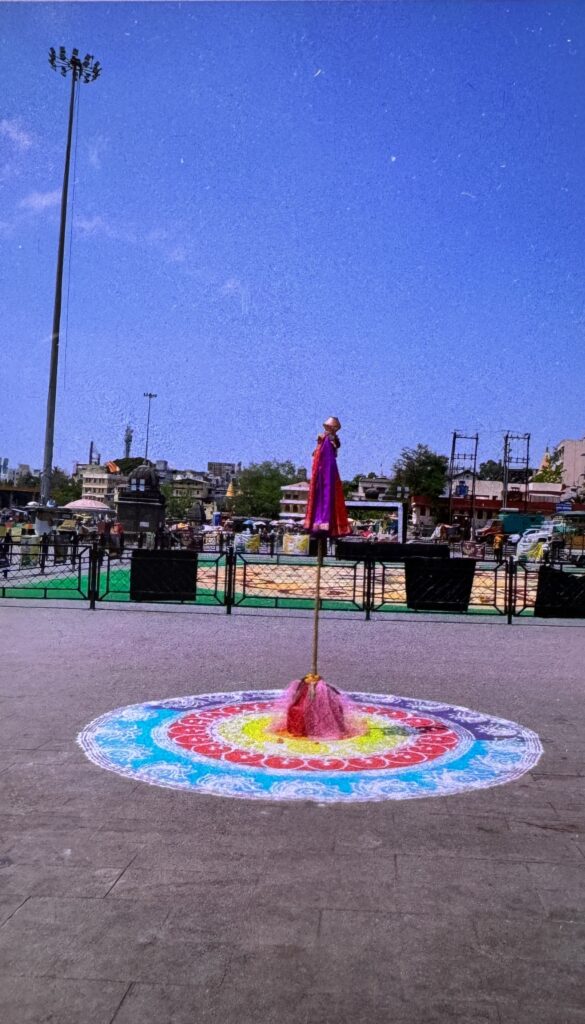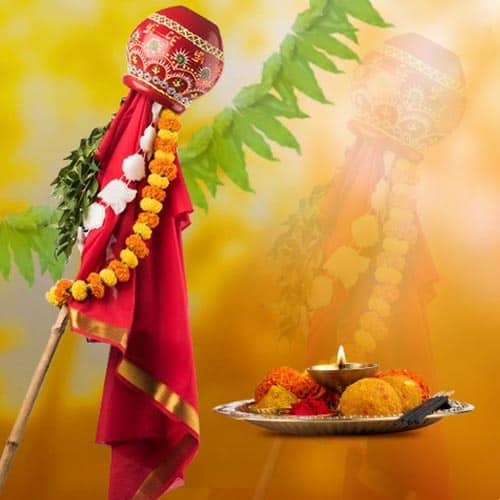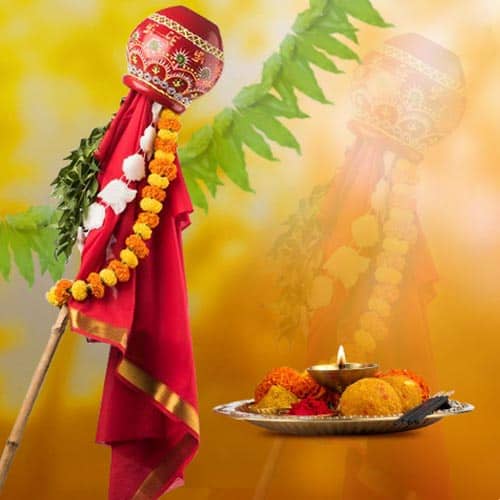Gudi Padwa is celebrated as the Hindu New Year in Maharashtra on the first day of the month of Chaitra which is the first month of the Hindu lunisolar calendar. This day is called Chaitra Shukla Pratipada
Shukla here means the waxing fortnight of the moon and Pratipada means the first step or a new beginning and in this context the first day when the moon starts to grow again after Amawasya.
The Hindu year as per both the Shalivahan calendar followed in central and southern India as well as the Vikram Samwat calendar mostly prevalent in North India starts with the month of Chaitra which also marks the onset of the spring and harvest seasons.
Gudi Dhwaja
The Gudi dhwaj is a prominent attraction during this festival and is hoisted in front of houses and in public places in Maharashtra. It is a flag made of a long bamboo pole which is decorated with a bright colour cloth, mostly a dhoti or saree, and adorned with neem and mango leaves and garlands of sugar candies and flowers with a small copper or silver pot placed upside down at the top.

Devotees get up early in the morning and take an auspicious bath. Womenfolk in maharashtrian households decorate the house entrances with beautiful rangoli (coloured powder) designs and the main doors are adorned with garlands of mango leaves and flowers called ‘toran’.
Following these preparations, families gather to prepare the “Gudi Puja,” a special prayer ceremony dedicated to Lord Brahma, the creator god. The Gudi Dhaja is hoisted with chants and prayers, seeking blessings for a prosperous and healthy new year. Special delicacies like “Purana Poli” (a flatbread stuffed with a sweet lentil paste) and “Shrikhand” (a sweetened yogurt dish) are prepared and shared amongst family and friends .

Throughout the day, people visit temples to seek blessings and participate in vibrant cultural processions. Traditional Marathi instruments like the dhol (drum) and tutari (trumpet) fill the air with a celebratory beat. The spirit of community and shared joy is palpable as families and friends come together to celebrate the new year.
Opens in a new window ru.m.wikipedia.org
Historical Significance
Gudi Padwa is not just a celebration of the new year; it also holds historical significance for the Marathi people. The festival coincides with the start of the “Shalivahana Shaka,” a calendar era established to commemorate the victory of King Shalivahana over the Shakas. The hoisting of the Gudi Dhwaja thus becomes a symbolic reminder of a glorious heritage.
Gudi Padwa or the Hindu New Year under different names in India
While Gudi Padwa is primarily celebrated in Maharashtra, similar festivals are observed under different names in other parts of India. In Karnataka and Andhra Pradesh, the festival is known as Ugadi. People create a colorful paste called “Ugadi Pachadi,” symbolizing the mixed flavors of life – sweet, sour, salty, bitter, and pungent – representing the diverse experiences one might encounter in the coming year.
The same festival is celebrated as Puthandu in Tamilnadu and Vishu in Kerala. In West Bengal, the Bengali New Year, Poila Boishakh, is celebrated with traditional delicacies and cultural programs, in Assam it is celebrated as Bohag Bihu and in Punjab as Baisakhi
Celebration of Spring season and Nature
Gudi Padwa transcends religious boundaries and serves as a celebration of spring’s arrival. The use of mango leaves and the overall theme of new beginnings resonate with the seasonal change. The festival encourages reflection on the past year and setting goals for the new one, fostering a sense of optimism and hope for the future.
Gudi Padwa and its significance
Gudi Padwa continues to hold significance for the Marathi community and is an occasion to reaffirm cultural and social ties with family and friends. While traditional rituals and customs remain important, social media sites provide a way for people to share greetings and well wishes with loved ones who may be far away. Additionally, local communities and cultural organisations hold traditional processions and events to foster community spirit.
